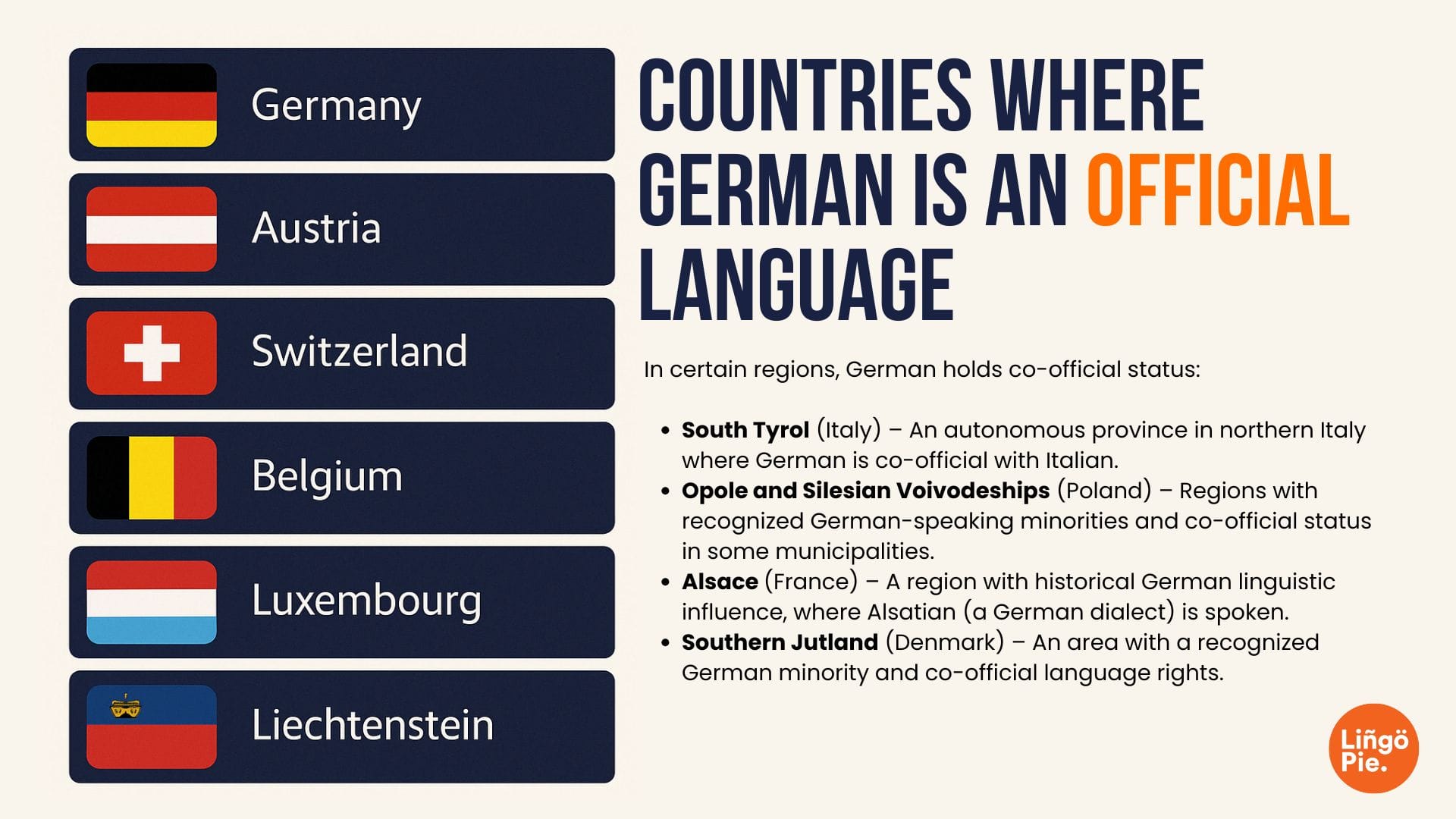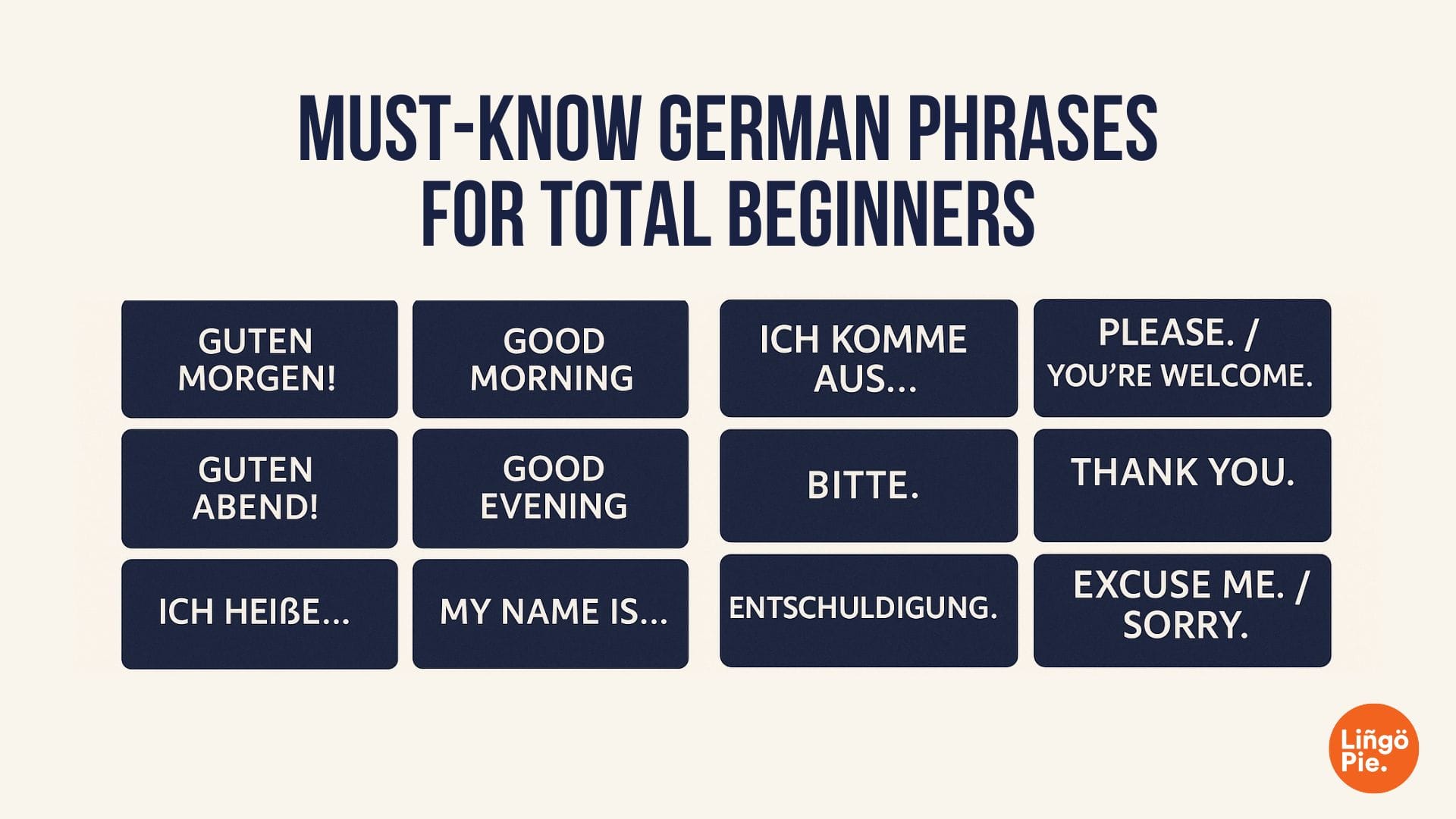Curious about how to learn German without spending years in textbooks? You're in the right place! German might have a reputation for complex grammar and tongue-twisting words, but thousands of beginners master the basics every year using smart strategies rather than brute-force memorization.
The reality is that there’s no single best way to learn German that works for everyone. What truly matters is finding a combination of methods that match your learning style, schedule, and goals. Some people thrive with immersive techniques, while others need structured grammar lessons.
In this guide, we'll discuss practical strategies, essential resources, and insider tips to help you speak, read, and understand German faster than traditional methods alone. We’ll also share a complete German learning plan to keep you on track.
- 10+ Easy German Short Stories For Beginners
- 5 German Cooking Shows For Learning German Culinary Terms
- 100 Most Common German Words and Phrases

Why Should You Learn German?
Germany offers numerous scholarships, job opportunities, and higher education options that make learning German a practical investment in your future. With programs like DAAD scholarships providing free university education and major German companies actively recruiting international talent, German language skills can directly translate to career advancement and financial benefits.
If you’re looking for a reason to say yes to this language, check out these 3 compelling reasons to learn German.
Career Advantages
German language skills significantly boost your employability and earning potential in the German job market. Germany stands as Europe’s largest economy and the fourth largest worldwide, creating more than enough demand for German-speaking professionals in sectors like:
- Engineering and manufacturing
- Information technology
- Healthcare and medical technology
- Renewable energy and sustainability
- Skilled trades and craftsmanship
Many international companies actively seek employees with German language abilities, particularly in fields like engineering, automotive, pharmaceuticals, and renewable energy. Organizations like Volkswagen, Siemens, BASF, and Deutsche Bank maintain offices worldwide, where German speakers receive preference during hiring and promotions.

Travel Benefits
Speaking German transforms your travel experience across German-speaking countries, which include Germany, Austria, Switzerland, Liechtenstein, and parts of Belgium, Italy, and Luxembourg.
When you can communicate in German, you move beyond the tourist bubble and discover authentic experiences. You'll navigate transportation systems with ease, order confidently in local restaurants, and handle unexpected situations without stress. Most importantly, you'll connect with locals who appreciate your effort to speak their language.
Educational Advantages
German universities offer world-class education with minimal or no tuition fees, even for international students. This creates educational opportunities that would be financially impossible in many other countries.
Take this for an example: A four-year degree at TU Munich (consistently ranked among the world’s top 50 universities) costs approximately €500 in administrative fees per semester. The equivalent education in the US, UK, or Australia would cost $80,000-$200,000.
The requirements? Typically, you need a B1-B2 level of German proficiency and your previous academic credentials.
Cultural Access
German proficiency gives you direct access to a rich cultural heritage spanning literature, philosophy, music, film, and science without relying on translations that often miss nuances and cultural context.
You'll enjoy works by influential thinkers like Goethe, Kafka, and Nietzsche in their original form. You can watch critically acclaimed German films like “Das Boot” or popular TV series like "Dark" without subtitles. The satisfaction of understanding German songs, jokes, and cultural references firsthand adds a new dimension to your appreciation of German-speaking culture.
How long does it take to learn German?
Learning German typically takes between 600-750 hours of dedicated study to reach conversational fluency (B1 level), where you can handle most everyday situations. For native English speakers, the Foreign Service Institute classifies German as a Category II language, meaning it’s moderately difficult but shares linguistic roots with English.
However, do note that your timeline will vary based on several factors, including your learning method, time commitment, and previous language experience. The good thing about this is that you can target one stage when trying to learn the language.
For instance, you'll start as A1 ( 75-100 hours of study), then progress to the following:
- A2 (elementary) another 150-200 hours
- B1 (intermediate) an additional 300-350 hours,
- B2 (upper intermediate) about 200-250 hours more
Most learners who study consistently for 1 hour daily can reach functional conversation skills within 8-12 months, while professional working proficiency (C1) generally requires 18-24 months of regular practice.

Factors That Affect Your Learning Timeline
Several key elements influence how quickly you'll progress in your German learning journey.
Previous Language Experience
If you've already learned another language, particularly one with Germanic roots like Dutch or Norwegian, you'll likely pick up German faster. Your brain has already built neural pathways for language acquisition, giving you a significant advantage. Students with no prior language learning experience typically need 20-30% more time to reach the same proficiency level.
Learning Method and Environment
Your chosen learning approach dramatically impacts your timeline:
- Immersion programs (living in Germany): Fastest route, potentially cutting learning time by half
- Structured courses with regular practice: Consistent progress with clear milestones
- Self-study only: Typically slower unless highly disciplined
- Mixed approaches (apps + conversation practice): Often most effective for busy learners
Time Commitment and Consistency
Research shows that consistent daily practice of 30-60 minutes is more effective than cramming several hours once weekly. Students who maintain regular study habits reach B1 level in approximately:
- 1 hour daily: 8-12 months
- 30 minutes daily: 16-20 months
- 2 hours daily: 5-7 months
Active vs. Passive Learning
Actively using German through speaking and writing accelerates learning significantly compared to passive activities like watching or listening alone. Learners who combine both approaches progress approximately 40% faster than those who focus primarily on passive consumption.
Remember that language learning isn't linear since you'll experience rapid progress in some areas while hitting plateaus in others. The key is maintaining consistent practice and using varied learning methods to keep momentum going throughout your German language journey.
How many words do you need to be fluent in German?
You don't need to learn 15,000-20,000 German words to achieve practical fluency. Research shows that mastering just 1,000-2,000 of the most frequently used German word families will enable you to understand about 80% of everyday German conversations and texts.
But what words should you learn exactly, and how should you go about it? Well, research from language acquisition experts suggests these:
- Focus on High-Frequency Words First - For example, you can start with common verbs (sein, haben, gehen, machen), everyday nouns (Zeit, Jahr, Weg, Haus), and connectors (und, aber, weil, dass).
- Learn Words in Context - Studies show vocabulary retention increases by 40% when learned in context rather than isolated word lists. For this, you can use German short stories, slow German news, and even shows and movies with dual subtitles.
- Prioritize Word Families - Learning one German word family (lemma) gives you access to multiple related words. For example, mastering "spielen" (to play) helps you understand Spieler (player), Spiel (game), verspielt (playful), and even Spielzeug (toy).
Note that you can also focus on German words and phrases that actually interests you. For instance, you can read our collections below:
- German Curse Words 101: Using German Swear Words Like a Pro
- 80+ Sweet German Terms Of Endearment For Loved Ones
- 30 Common German Slang Words And Phrases To Learn This Year

The Best Ways To Learn German
1. Focus on High-Impact Learning First
Not all German learning is created equal. Focus on these essentials for maximum progress:
- Master pronunciation fundamentals before anything else
- Learn the 100 most frequently used German words (covers 50% of everyday speech!)
- Understand noun genders (der, die, das) through pattern recognition
- Practice basic conversation structures you'll actually use
Create a visual mind map connecting related German words to their gender using color coding (blue for masculine, red for feminine, green for neuter). This engages multiple learning pathways in your brain simultaneously.
2. Implement Micro-Immersion Techniques
Full immersion works wonders, but you don't need to move to Berlin. Create a German environment wherever you are:
- Change your phone language to German
- Follow German social media accounts in topics you're interested in
- Listen to German music during your commute
- Watch 10 minutes of German YouTube videos with dual subtitles
- Label household items with German words and articles
Small, consistent exposure trumps occasional intensive study sessions. The brain needs regular reinforcement to build lasting neural pathways for language acquisition.
3. Leverage the Power of Context-Based Learning
Isolated vocabulary lists are the enemy of fast progress:
- Learn words in thematic groups (all kitchen items together, all travel phrases together)
- Study complete sentences rather than individual words
- Use image associations rather than direct translations
- Practice in realistic scenarios you'll encounter (ordering food, asking directions)
- Connect new vocabulary to stories or mental images
4. Use Technology Strategically
The digital age offers powerful tools for German learners:
- Language apps: Use Duolingo or Babbel for 10-minute daily practice sessions
- Streaming services: Learn German with Lingopie through entertaining German shows
- Browser extensions: Install Language Reactor for YouTube to see dual-language subtitles
- Spaced repetition systems: Use Anki for reviewing vocabulary at optimal intervals
- AI language partners: Practice conversation with AI tutors when native speakers aren't available
5. Develop a Consistent Learning Routine
Consistency beats intensity every time for language learning:
- Establish a daily 20-minute German practice session (same time each day)
- Use habit stacking (combine German practice with existing routines)
- Track your progress with a visual system to maintain motivation
- Create weekly learning goals with specific outcomes
- Reward yourself after completing milestones
6. Master the Modal Verb Shortcut
Modal verbs are your secret weapon for speaking German quickly:
- Learn the 7 German modal verbs first (können, wollen, sollen, dürfen, müssen, möchten, mögen)
- Use them to express complex ideas without knowing numerous verb conjugations
- Combine with infinitive verbs at the end of sentences for instant flexibility
- Practice creating sentences following this pattern: Subject + Modal Verb + Object + Infinitive Verb
Instead of learning multiple conjugations, master "Ich kann..." (I can...) and add any infinitive verb at the end.
7. Use the Cognate Advantage
German shares thousands of words with English that sound similar and have related meanings:
- Start by learning obvious cognates (Haus/house, trinken/drink, Name/name)
- Recognize common sound shifts (t→z, d→t, p→pf)
- Look for patterns in word endings (-tion in English often matches -tion in German)
- Build vocabulary faster by prioritizing the 3,000+ German-English cognates
You already know hundreds of German words! Words ending in "-tion" are nearly identical in both languages (Information, Situation, Motivation).
8. Embrace Speaking From Day One
Don't wait until you "feel ready" to speak German:
- Practice basic phrases out loud, even when alone
- Record yourself speaking and compare to native pronunciations
- Join language exchange platforms like Tandem or HelloTalk
- Attend virtual German conversation meetups
- Create German audio journals describing your day in simple terms
Best Resources For Learning German
Finding the right tools makes all the difference when learning German. These top resources complement each other to build your vocabulary, grammar, and conversation skills effectively.
1. Lingopie - Best Way To Learn German Through Entertainment
Lingopie transforms German TV shows and movies into powerful learning tools. This platform stands out by combining entertainment with education - you watch authentic German content with dual-language subtitles and interactive features. Simply click any word to see its translation, save vocabulary for later review, and use the slow-playback feature to catch pronunciation details.
What makes Lingopie exceptional is how it turns "watching time" into "learning time" without feeling like studying. Users typically report understanding basic conversations after just 2-3 months of regular viewing.
2. Duolingo - Great for Daily Practice Habits
Duolingo offers bite-sized German lessons perfect for consistent daily practice. The gamified approach keeps you motivated with points, streaks, and friendly competition. While not comprehensive enough on its own, Duolingo works wonderfully as a supplement to maintain daily contact with German between more intensive study sessions.
3. Deutsche Welle - Free Structured Courses for All Levels
Deutsche Welle provides professional-quality German courses completely free. Created by Germany's international broadcaster, these materials follow European language standards with clear progression from beginner to advanced levels.
Their "Nicos Weg" video series follows a character navigating life in Germany, teaching practical language in realistic situations. The site includes placement tests, downloadable worksheets, and audio examples of authentic German pronunciation from different regions.
4. Anki - Powerful Vocabulary Building System
Anki's spaced repetition flashcard system optimizes your memory retention through scientifically-proven timing. This free tool allows you to create custom flashcards or download pre-made German decks, then shows them at precisely the right intervals to maximize learning efficiency.
5. Tandem - Practice With Native Speakers
Tandem connects you directly with native German speakers for language exchange. This app matches you with partners based on your interests, learning goals, and schedule. Regular conversation practice with natives dramatically improves your pronunciation, colloquial vocabulary, and confidence.
30-Day German Learning Blueprint
Here's exactly what to do for the next month to make rapid progress:
Week 1: Foundation Building
- Day 1-2: Master German pronunciation fundamentals
- Day 3-5: Learn the 100 most common German words with correct articles
- Day 6-7: Practice basic conversation patterns and greetings
Week 2: Daily Communication
- Day 8-10: Learn vocabulary for food, transportation, and shopping
- Day 11-12: Master asking questions and understanding directions
- Day 13-14: Practice describing your daily routine and preferences
Week 3: Immersion Acceleration
- Day 15-17: Watch 15 minutes of German content daily on Lingopie
- Day 18-19: Have your first language exchange conversation (even just 5 minutes)
- Day 20-21: Start thinking in German by narrating simple activities to yourself
Week 4: Practical Application
- Day 22-24: Learn vocabulary for your specific interests or needs
- Day 25-27: Practice longer conversations about familiar topics
- Day 28-30: Assess progress and adjust strategy for month two
Ready To Start Your German Journey?
Learning German doesn't have to be overwhelming. With these practical strategies and resources like Lingopie that make learning enjoyable, you're well-equipped to make rapid progress.
Remember: Consistency beats intensity. Small daily practices will take you further than occasional cramming sessions. Start your German learning journey today, and in just a few months, you'll be surprised by how much you can understand and communicate.
Viel Erfolg beim Deutschlernen! (Good luck with learning German!)





![Best Way to Learn French on Your Own [2025 Guide]](/blog/content/images/2024/12/Best-Way-to-Learn-French-on-Your-Own--1-.jpg)
![Math In Spanish: A Complete Beginner’s Guide [2025]](/blog/content/images/size/w1200/2025/04/Math-in-spanish.jpg)

![Swiss German And German Language: 5 Major Differences [Guide]](/blog/content/images/size/w300/2025/05/Swiss-German-And-German-Language.jpg)

